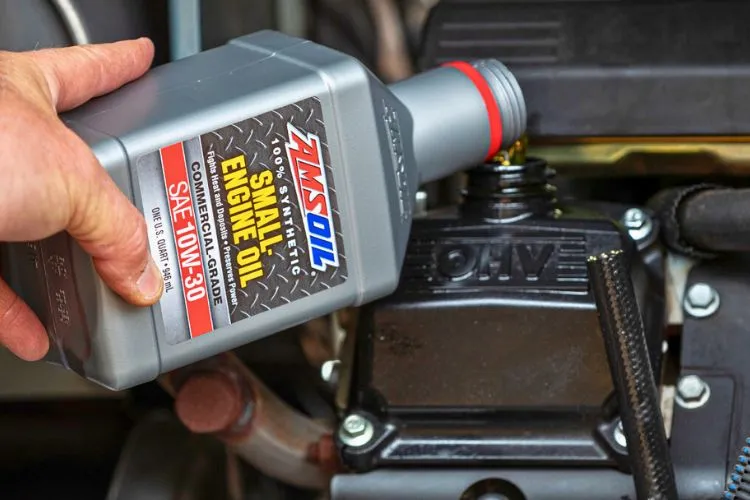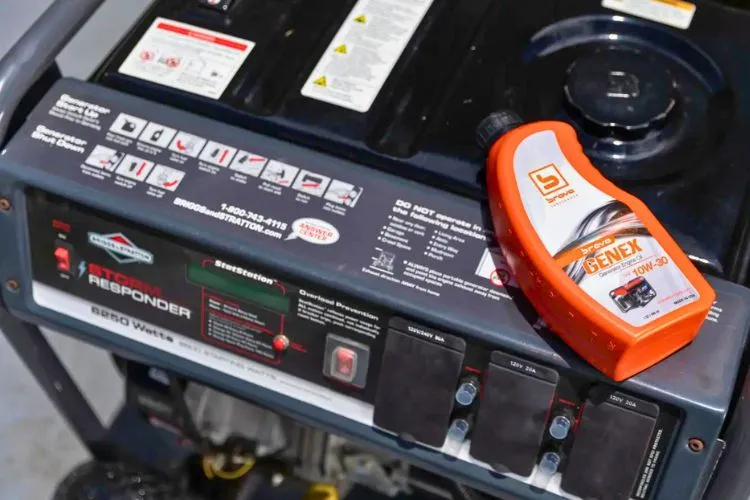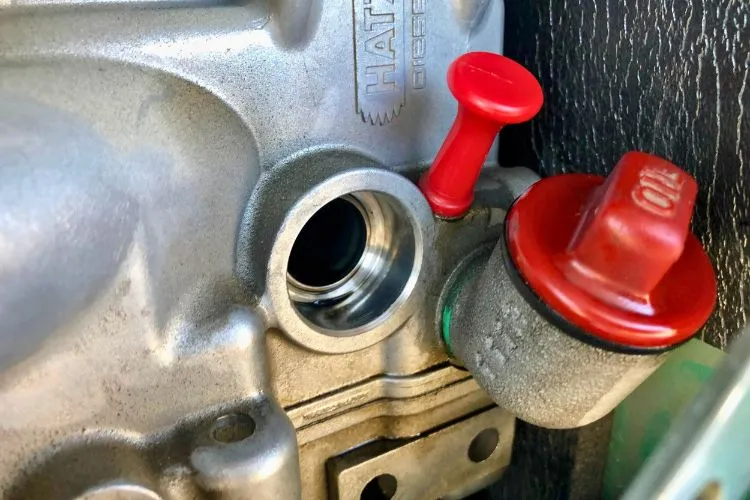Choosing the correct oil for your generator is a critical decision that can influence its performance and lifespan.
The right oil ensures that your generator runs smoothly and efficiently. It also diminishes the risk of breakdowns and costly repairs. But, what generator oil should I use?

In this article, we will guide you through the process of picking the best oil for your generator.
What Generator Oil Should I Use?
Oils are categorized by their viscosity. Viscosity refers to the thickness of the oil and how well it flows at different temperatures.
The rating on the oil can might look like 10W-30. This tells you the oil flow at cold and high temperatures.
The ‘W’ stands for winter. The number before it represents the flow at cold temperatures. The number after shows how the oil flows at the engine’s operating temperature.
The types of engine oils are conventional, synthetic, and synthetic blend. Conventional oil is the most common and offers standard protection.
Synthetic oils are designed to handle extreme temperatures and last longer. Synthetic blend oils combine features of both.
Factors to Consider When Choosing Oil for Your Generator
Picking the right oil for your generator starts with your generator type. Check the owner’s manual for the manufacturer’s recommendations. This is your best guide.

Think about where you live and the seasons when you’ll use the generator. If you’re in a place with cold winters, you’ll need oil that flows well at lower temperatures. For steady warm climates, thicker oils may be better.
Consider the age of your generator and how much you use it. Older generators or those used often may need a different type of oil than what the manual suggests.
Recommended Generator Oils by Brand and Model
When selecting oil for your generator, specific brands and models may recommend particular types.
For instance, Honda generators often favor 10W-30 for general use, while a Generac might recommend SAE 30 for warmer temperatures and a synthetic 5W-30 for colder conditions.
Yamaha generators generally perform well with 10W-40. Always verify with your model’s manual or manufacturer’s website, as using the correct oil is crucial for efficiency and longevity.
Brands like Briggs & Stratton and Kohler also provide their own branded oils specifically formulated for optimal performance in their engines. Remember, the right oil can significantly affect your generator’s operation and durability.
How to Check and Change Generator Oil?
Knowing how to check and change your generator oil is key. Use a dipstick to see the oil level. Doing this before every use can prevent engine damage. If the oil is dirty or low, it’s time for a change.
To change the oil, turn off the generator and let it cool. Remove the oil cap and drain the oil. Put in new oil to the correct level. Be sure not to overfill. Put the cap back on securely.
Pro Tips for Generator Maintenance
Maintaining your generator extends beyond regular oil changes. Pay attention to your maintenance schedule—frequent use or harsh conditions may demand more frequent servicing.

Opt for high-grade oil that matches your generator’s specifications; this isn’t the place to cut costs, as premium oils protect against wear and corrosion more effectively.
Inspect your generator regularly for leaks or worn parts, and keep it clean from dust and debris.
By proactively caring for your generator, you not only ensure it operates reliably but also prevent the escalation of minor issues into significant, costly problems.
Common Mistakes to Avoid
Always monitor the oil level carefully. Overfilling or underfilling can harm your generator. It’s also a mistake to use car engine oil.
It may not have the right properties for a generator. Stick to the change schedule religiously. Neglect can lead to failures when you need your generator most.
Understanding Oil Viscosity and Ratings
Oil viscosity, a critical factor for generator health, measures oil’s resistance to flow. The viscosity rating, marked with an “SAE” (Society of Automotive Engineers) code like 10W-30, reveals the oil’s flow efficiency at cold and hot temperatures.
The “W” indicates winter or cold-start viscosity, highlighting the oil’s performance in cold climates; the lower the first number, the better the cold start.

The second number assesses the oil’s thickness at 100°C, crucial for maintaining a protective film under engine heat. Selecting the right viscosity ensures optimal lubrication, reducing wear and enhancing performance.
Generators operate efficiently with specific oil types, and incorrect viscosity can lead to increased friction, overheating, and engine damage.
Following manufacturers’ recommendations and choosing oils that meet API standards is essential for safeguarding your equipment, guaranteeing longevity, and ensuring peak performance under varying environmental conditions.
You may also read: How To Reduce Generator Fuel Consumption
Frequently Asked Questions (FAQs)
Can I use synthetic oil in my generator?
Yes, synthetic oil can be used in most generators and is often recommended for its ability to function well under extreme temperatures and provide longer-lasting protection.
How often should I change my generator’s oil?
Change the oil after the first 20-30 hours of use for a new generator, then every 100 hours or annually, whichever comes first, unless the manual specifies otherwise.
Is the brand of oil important for my generator?
While the brand is not as critical as the correct type and viscosity, using a reputable brand ensures consistent quality and engine protection.
What happens if I use the wrong oil in my generator?
Using the wrong oil can lead to poor engine performance, increased wear and tear, and potentially costly engine damage.
Does weather affect the type of oil I should use for my generator?
Yes, in cold weather, use oil with a lower ‘W’ viscosity rating for better flow, and in hot weather, a higher viscosity oil is often better to maintain protection.
Conclusion:
The correct selection of oil for your generator cannot be taken lightly. It’s the lifeblood of your generator’s operation. Always adhere to the guidelines set by the manufacturer and keep up with regular maintenance.
By choosing the right oil and keeping your generator well-maintained, you ensure its reliability and longevity. You also gain peace of mind, knowing that your generator will serve you well when you need it most.
